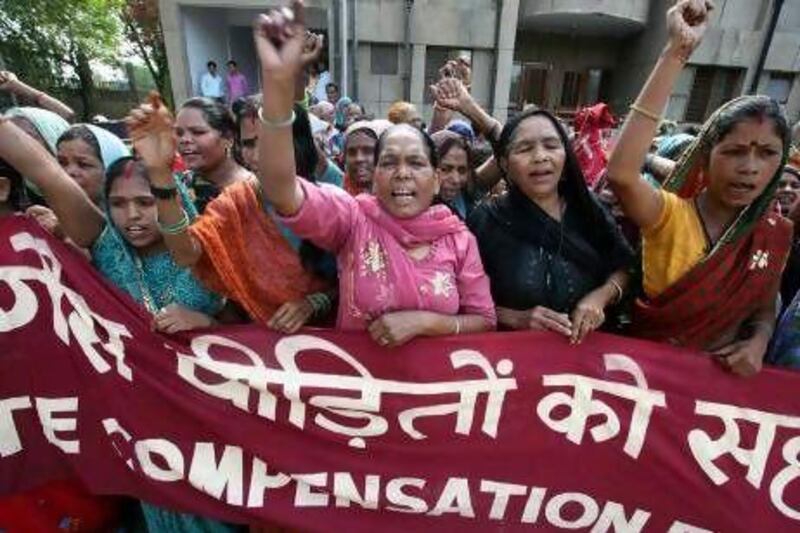NEW DELHI // India's home affairs minister, P Chidambaram, yesterday said it was unfair to say that the government had "not taken any steps for the disposal of toxic waste" from the 1984 Union Carbide disaster in Bhopal.
On May 29, the Indian Supreme Court ordered the government to clean up the waste, saying the problem had been ignored for 28 years "because the victims of Bhopal gas tragedy are poor".
Mr Chidambaram told reporters that the federal government had attempted to dispose of the Bhopal waste in the states of Gujarat and Maharashtra, but both refused to allow the toxic chemicals in. The federal government has contracted a German company to dispose of the waste, but the issue of where the chemicals are to be incinerated has not been determined, Mr Chidambaram said, adding that the government would make a decision on Sunday.
Union Carbide's Indian plant in Bhopal blew up in December 1984, leaking methyl isocyanate gas, which is used to produce pesticides and adhesives. In one of the world's worst industrial accidents, thousands of people died and the health of more than half a million others was harmed.
In the court ruling, Justice GS Singhvi and Justice SJ Mukhopadhaya in New Delhi slammed the government for its "apathy" in dealing with the situation.
"There is a lack of seriousness in handling this problem."
Rashida Bi, 57, a member of the victims' organisation Bhopal Gas Peedit Mahila Stationery Karmchari Sangh, said she had a meeting yesterday with Salman Khurshid, the minister of law, and Mr Chidambaram during which she demanded that the government revise the official number of victims affected by the Bhopal crisis.
"The danger lies in tomorrow," said Mrs Bi. "There are children still being born with deformities. It is tough getting girls married off, and when they have deformed babies, everyone panics again."
The meeting coincided with World Environment Day and hundreds of residents of Bhopal marched through the city during Mr Chidambaram's visit.
"It is not just the toxic waste," said Mrs Bi. "We also demanded that the waste not be disposed off anywhere in India. There is also a matter of people still getting sick as tonnes of hazardous waste is still on the ground and seeping into the groundwater."
The Bhopal Group for Information and Action, the organisation that filed the case to have the waste removed, has been trying since 1990 to have the waste cleared and for clean drinking water to be provided.
The May court ruling is a major victory for the group's attempt to get Dow Chemicals, which purchased Union Carbide in 2001, to pay additional damages.
"Dow propaganda had said that there was no contamination of the drinking water in Bhopal — but now the Supreme Court has established that the water was polluted by the gas disaster. This helps set some sort of precedent," Rachna Dhingra, a member of the group said yesterday.
Other victim advocacy groups and the state government of Madhya Pradesh, where Bhopal is located, have also expressed outrage that Dow Chemicals is sponsoring the Olympic Games in London in July and August.
Indian athletes and the country's Olympic committee had threatened to boycott the games, but they have since backed down.
Ms Dhingra said that her group plans to hold an Olympics of its own to draw attention to the alleged damage Dow Chemicals has done to people across the globe.
"We're trying to get children who have been poisoned by Dow, from across the world, to come here and participate in a two-day special Olympics," said Ms Dhingra. "It's difficult. We're trying to get children from Vietnam, from the US, from Nicaragua. It's a small thing, but it will be a statement."
The constant pressure brought to bear upon Dow apparently spurred the company to hire a research firm to spy on Bhopal activists.
In February, WikiLeaks published internal emails from the global intelligence company Stratfor, which showed that Dow had been paying Stratfor to monitor Bhopal activists and to track media coverage of the gas disaster.
sbhattacharya@thenational.ae
* With additional reporting by IANS and Agence France-Presse





